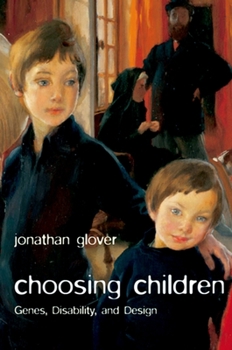Choosing Children: Genes, Disability, and Design
Select Format
Select Condition 
Book Overview
Progress in genetic and reproductive technology now offers us the possibility of choosing what kinds of children we do and don't have. Should we welcome this power, or should we fear its implications? There is no ethical question more urgent than this: we may be at a turning-point in the history of humanity. The renowned moral philosopher and best-selling author Jonathan Glover shows us how we might try to answer this question, and other provoking...
Format:Paperback
Language:English
ISBN:0199238499
ISBN13:9780199238491
Release Date:February 2008
Publisher:Oxford University Press (UK)
Length:128 Pages
Weight:0.35 lbs.
Dimensions:0.3" x 5.5" x 8.0"
Customer Reviews
1 rating
Designing the Future
Published by Thriftbooks.com User , 16 years ago
This short work of three chapters explores the implications of genetic science on the possibilities of designing our children to specifications. It covers the practical possibilities and the attendant moral decisions that apply to our decisions. Much of the discourse on this subject involves the question of what counts as "disabilities" and to what extent are we justified in producing children without them? Delving deeper, Glover asks the fundamental question, "To what do we owe our children?" On the surface, some decisions appear straightforward. If we know beforehand that our child is likely to be born with Down's syndrome, or blind, or deaf, should we not prevent the birth of that child? In answering "yes", are we not transferring our own perception of what happiness and enjoyment of life mean to us to that of the unborn child? Many have criticized the deaf lesbian couple who obtained the sperms of a male donor that ensured that their child was born deaf. The couple disputes the suggestion that being deaf was a disability. Many examples - blindness, etc were given and discussed. Glover also discusses the competing rights of parents and their children. The right of choice we give parents exposes the problem of what rights we ought to recognize in the children. It makes us wonder what rights are, and whether there are different levels of rights, entrenched rights, and inalienable rights, and who decides. It forces us to contemplate the diversity of human emotions and psychology that makes for true humanity. Human identity surely must allow for such diversity. Atheists, for example, may mount irrefutable rational arguments against the assertions of the existence of god; but would we be right to deny people the right to believe if that belief makes them happy and keeps them comforted? Ought we to apply the Kantian principle that people must not be used as a means? If so, can we justify having a second child so that we can use its bone marrow to save our first child from a fatal bone marrow disease? This is a profound book but short and extremely lucid. It points the way, and the reader may not agree with the author's own inclinations, but he must surely think for himself what grounds he has for choosing a different path.





